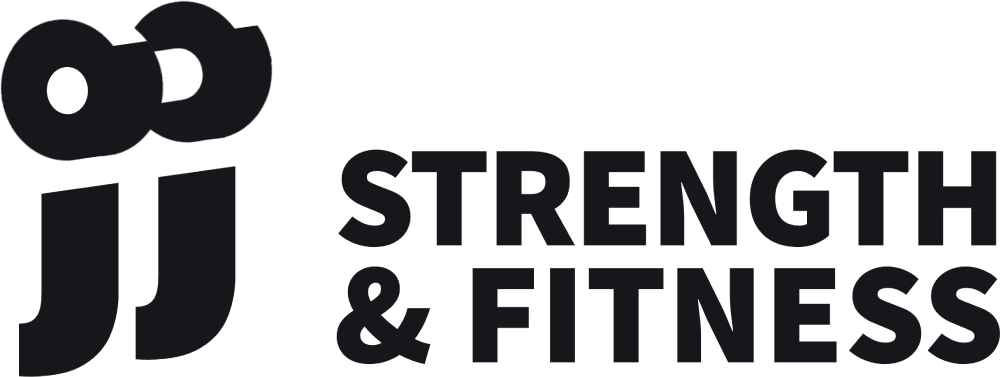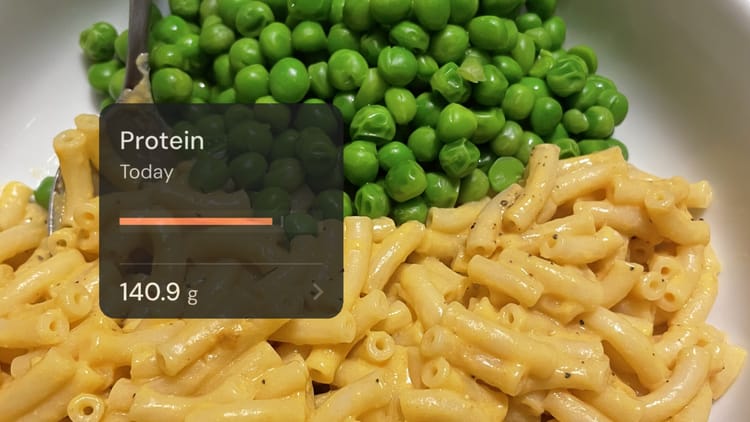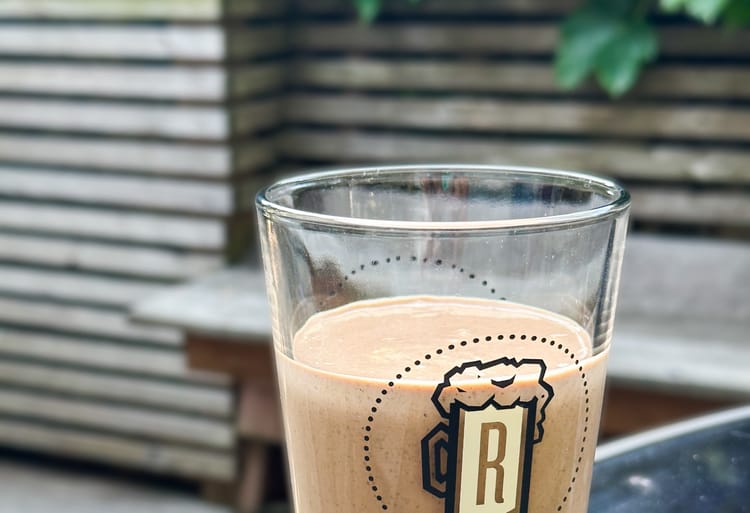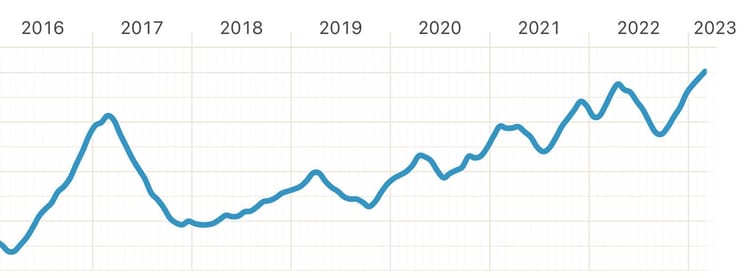Why I'm a vegan who loves to eat
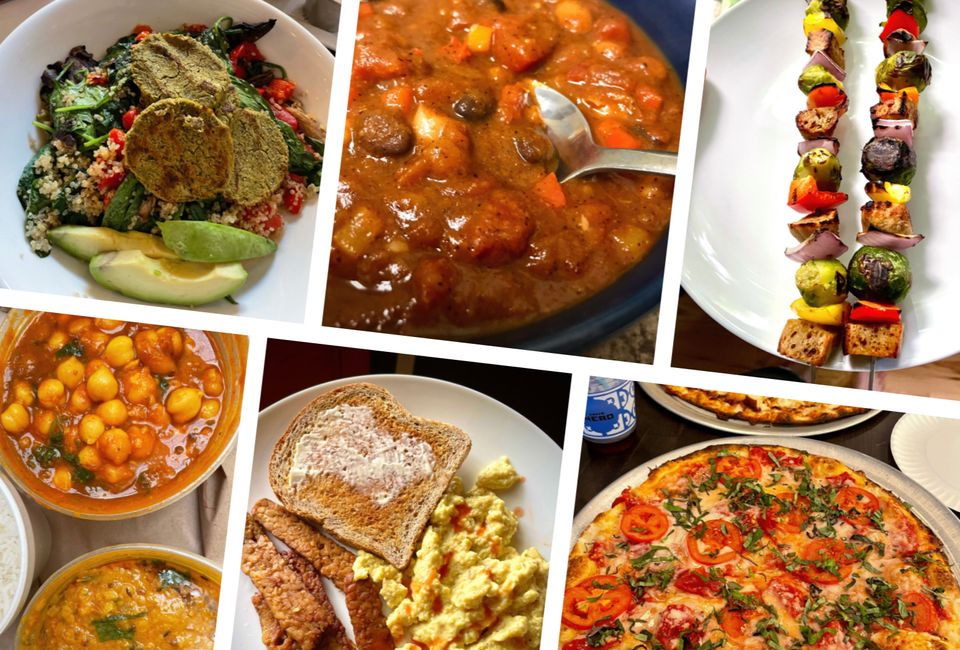
Four years ago in 2019, I made a New Year's resolution to eat less meat. I had read about the environmental impacts of meat production and the ways it wasted land and water. I heard the World Health Organization say bacon and salami can cause cancer. I was constantly choosing willful ignorance of animal killings in order to enjoy meat.
There are no images of animal harm in this article.
The cognitive dissonance between my food choices and my values was steadily growing. So I figured skipping my ground beef and finding replacements for chicken breasts wouldn't be too hard.
Boy, was I wrong. It was way easier than I expected.
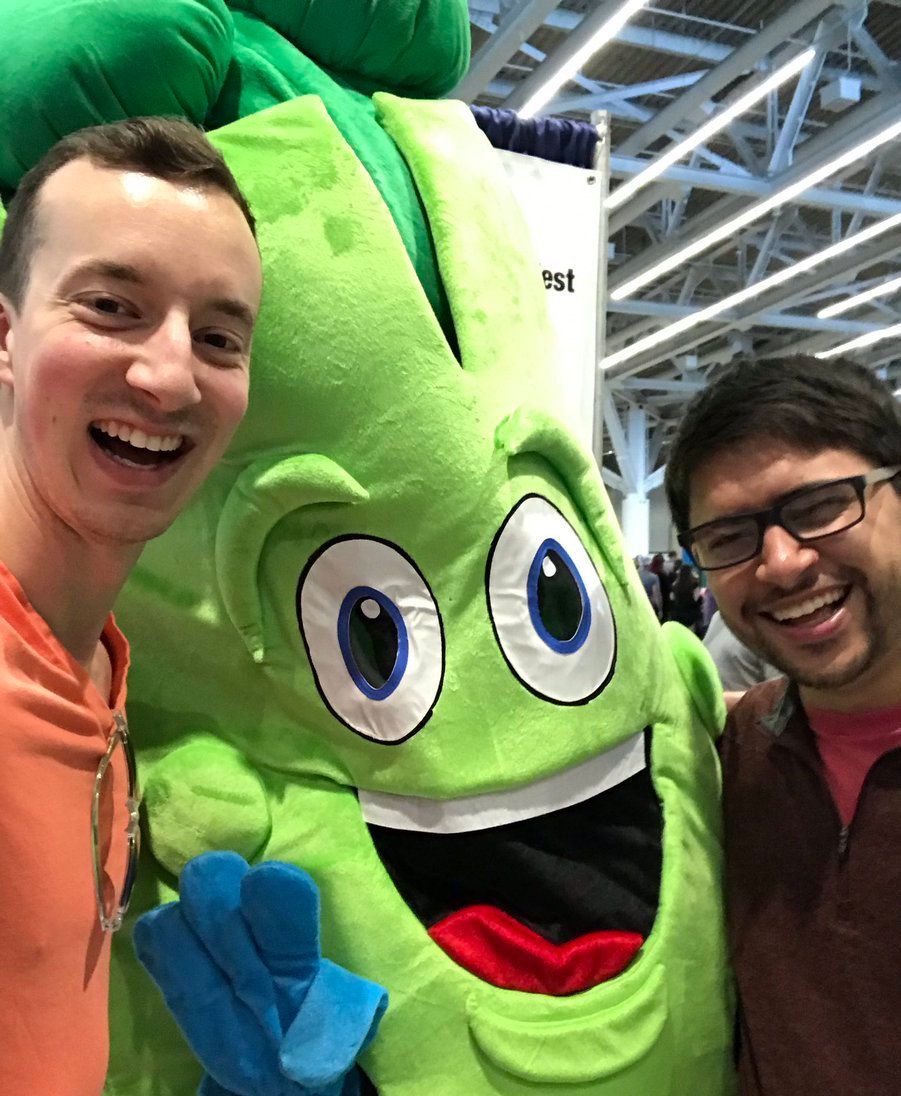
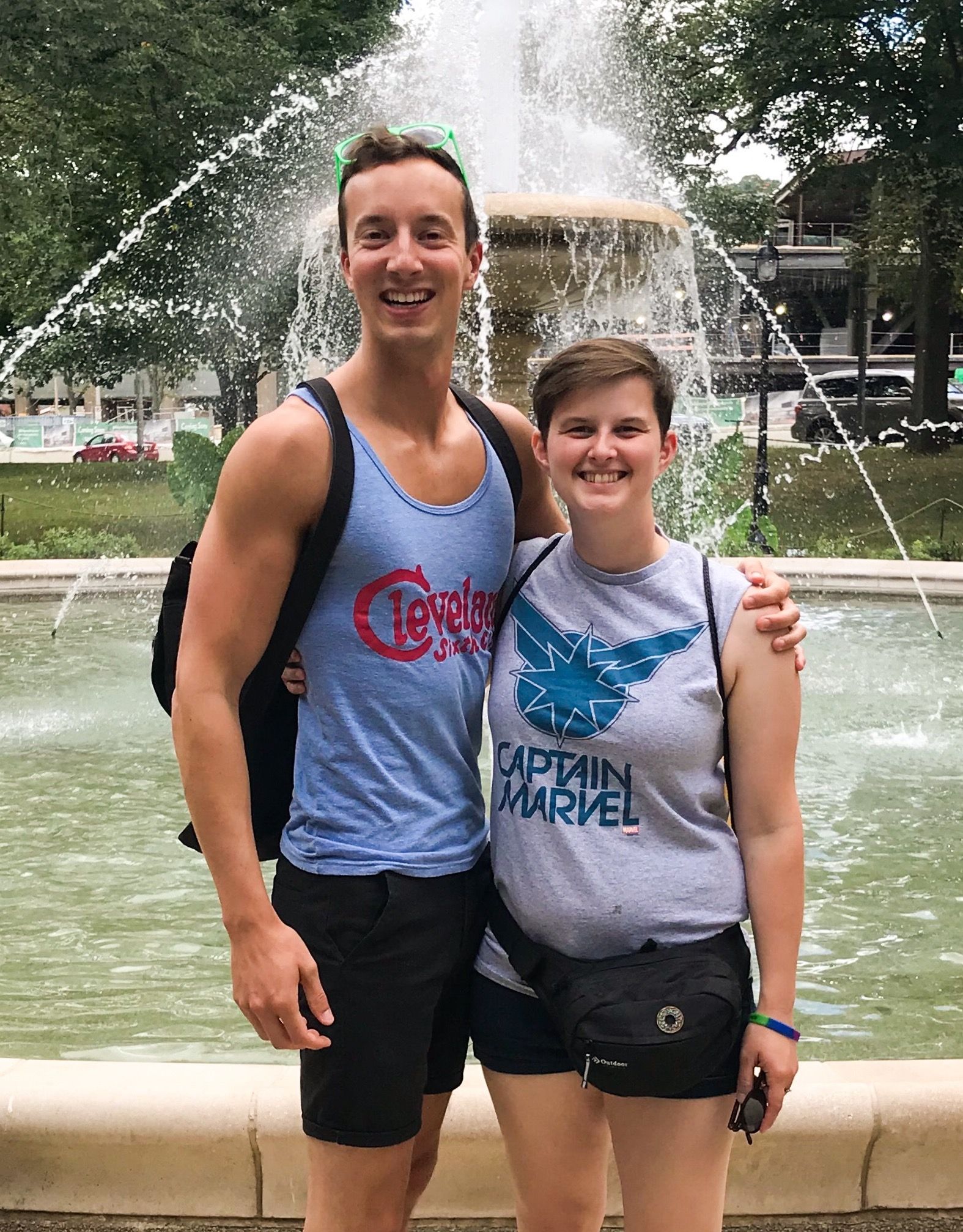
Hanging out with my friends (and Brock O. Lee) at Cleveland VegFest and Pittsburgh VegFest
Not only was cooking faster and less complicated when I didn't have to deal with raw meat, but eating was more fun, too. Soon I was smashing veggie burgers, making pots of hearty chili, and trying new-to-me foods like baba ganoush, seitan, and Thai curry.
By summer that year, I was leaving behind cheese and milk and testing out alternatives for yogurt and eggs. And I had wonderful friends helping me along in my adventure, which kept it exciting.
Eating a fully vegan diet soon felt like a reasonable goal, which also made it feel morally necessary. But this wasn't all for pure selflessness!
I'd have gone vegan sooner if only someone had told me I would:
- make tasty meals that are simpler, more colorful, and less expensive
- eat for satisfaction without getting bloated
- have more energy for my tasks and exercises
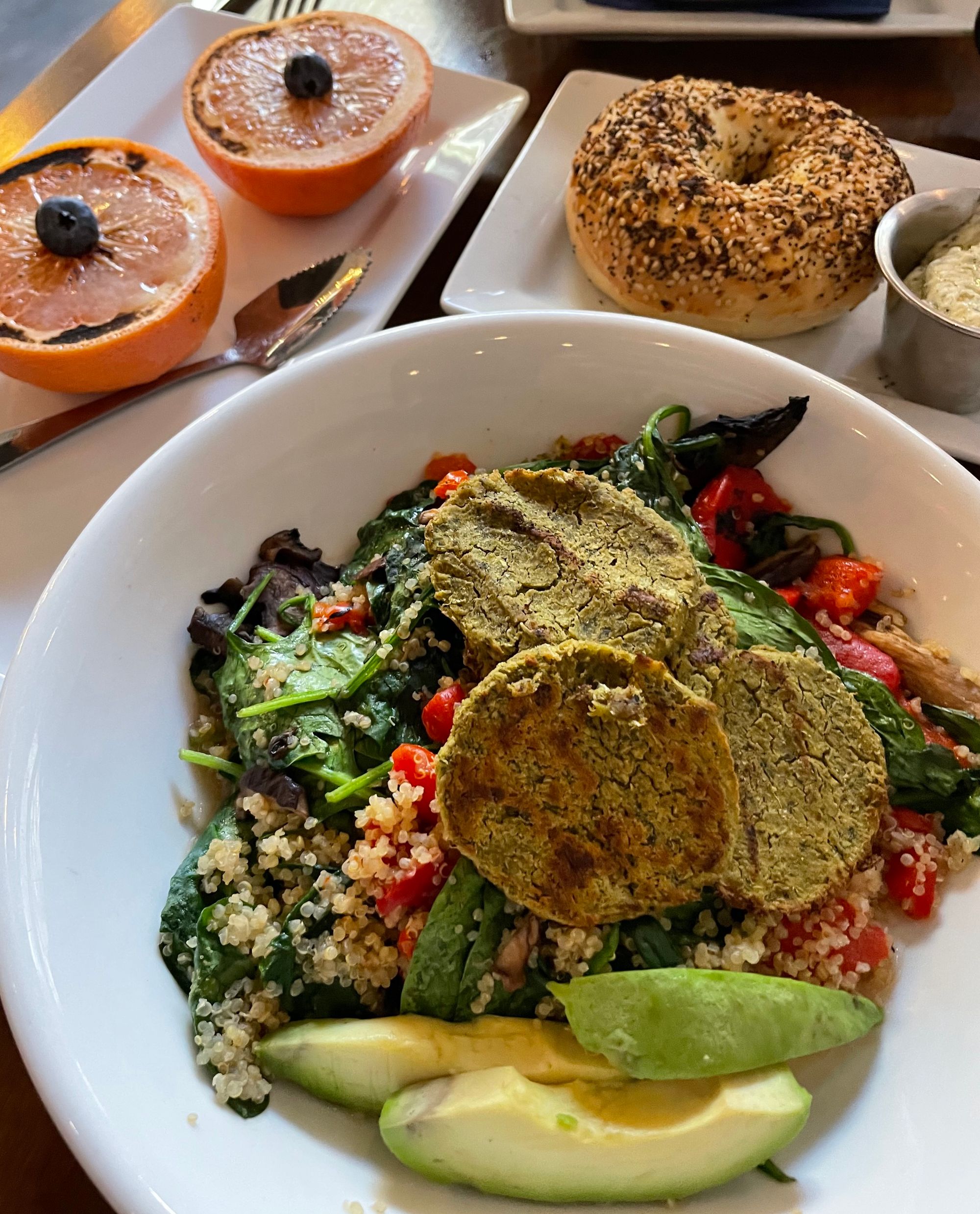
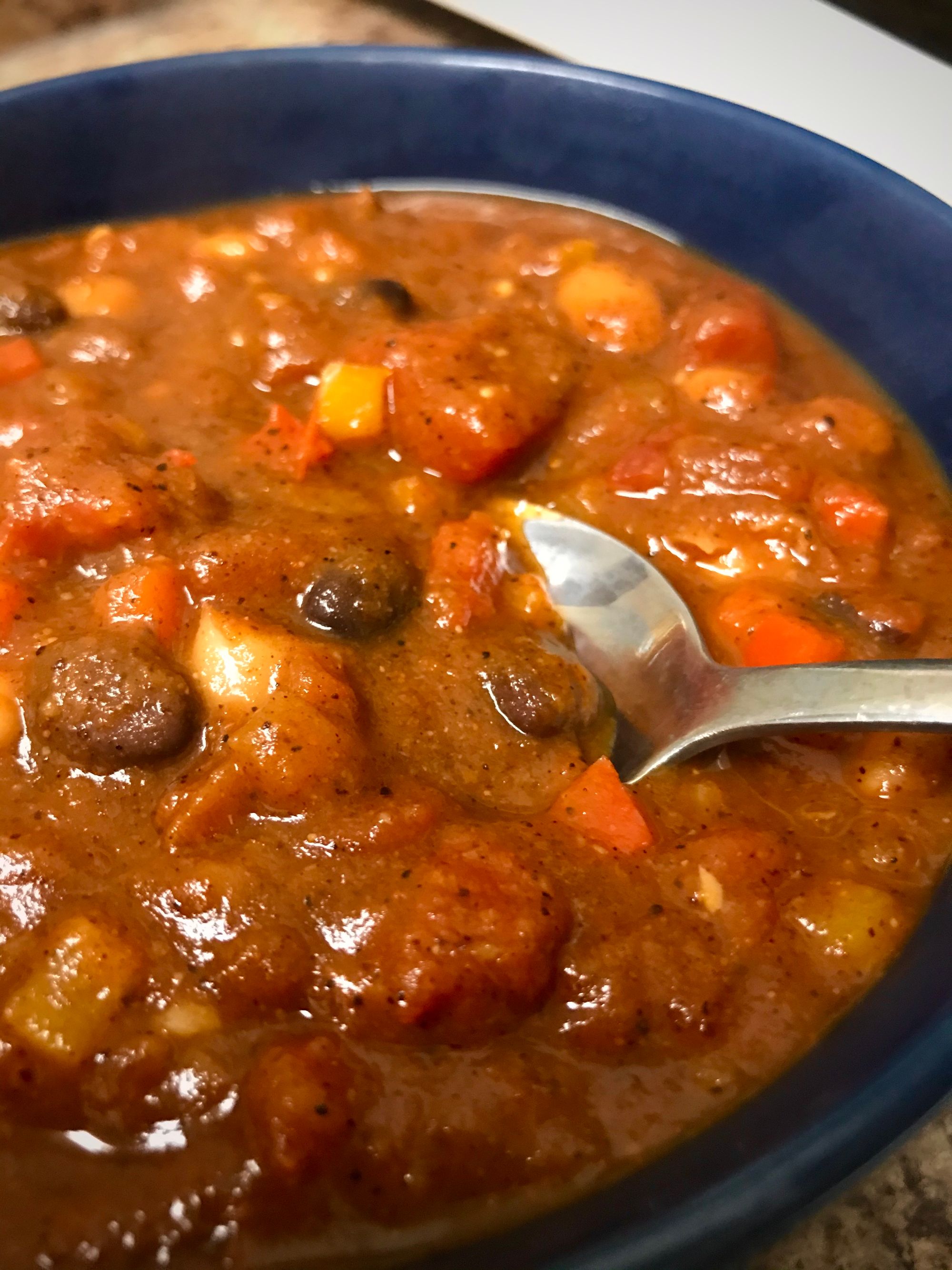
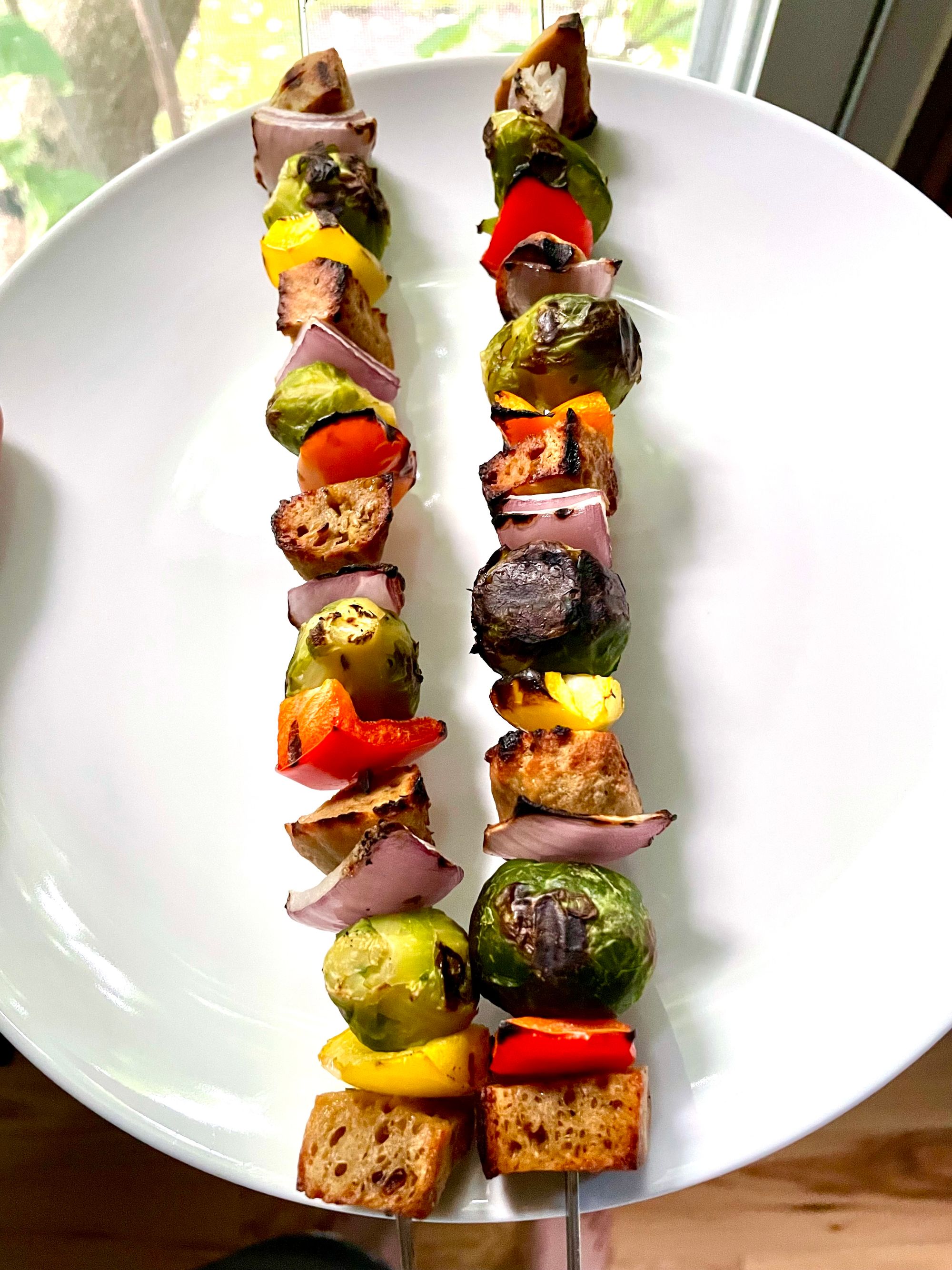
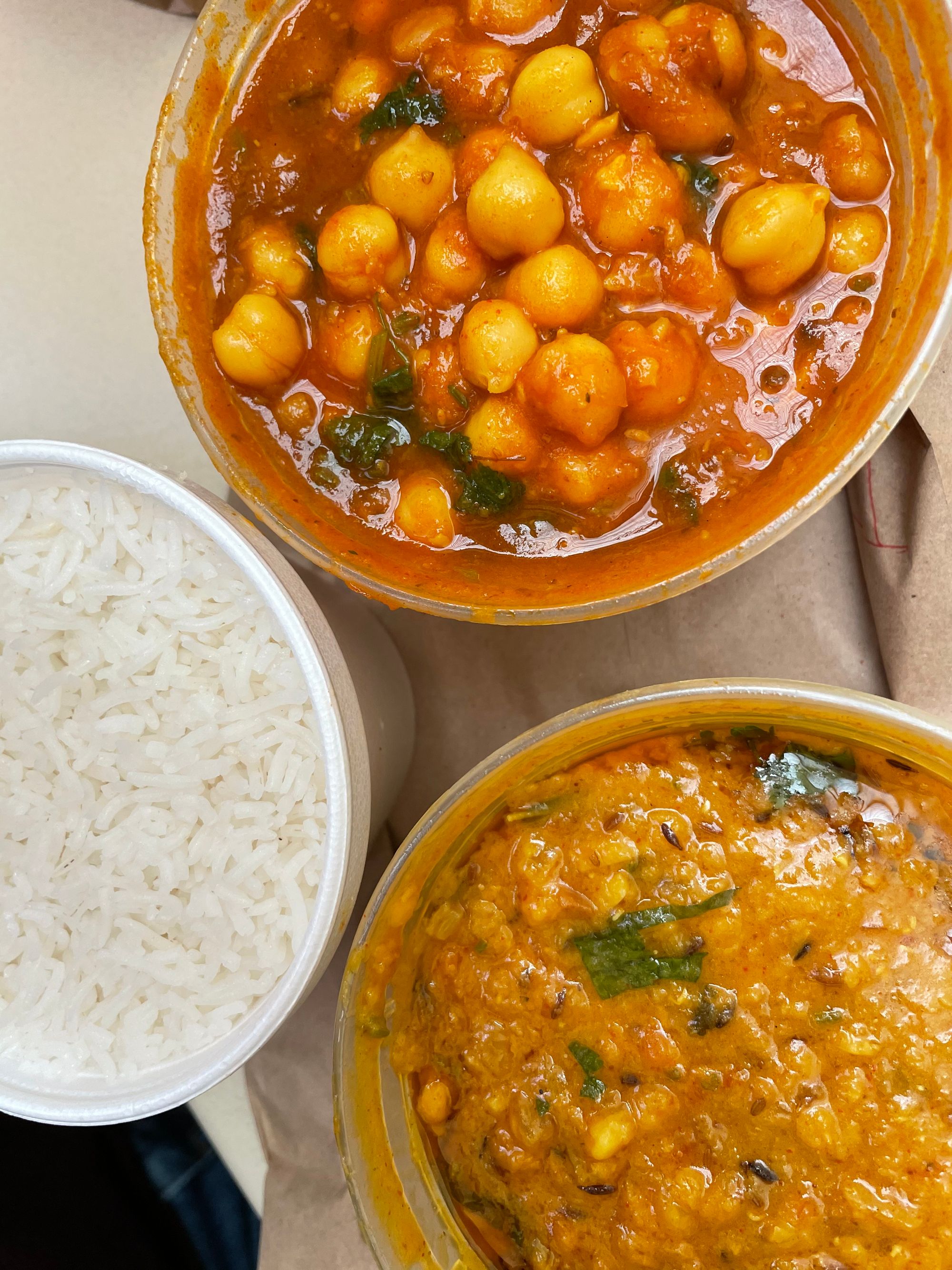
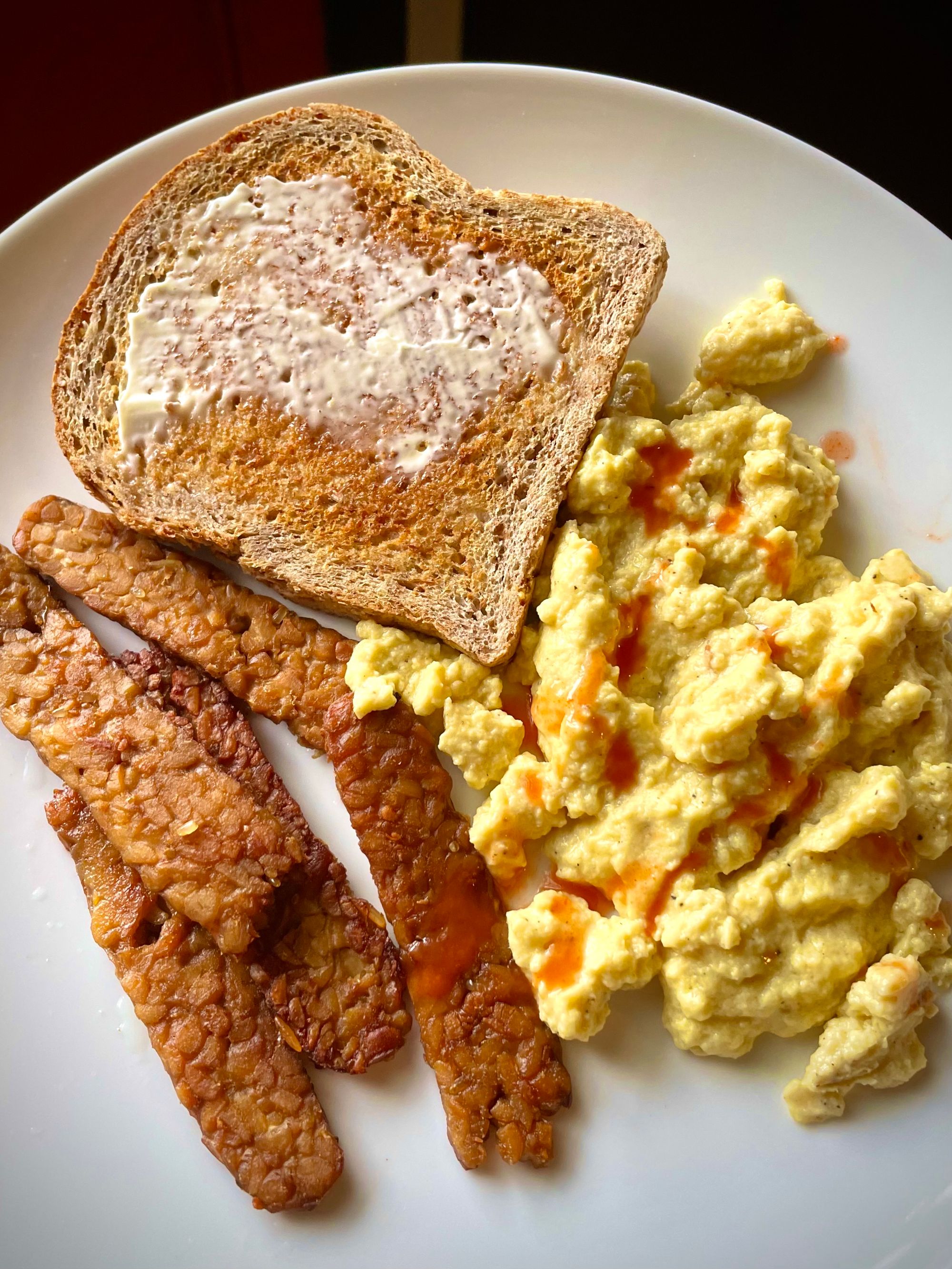
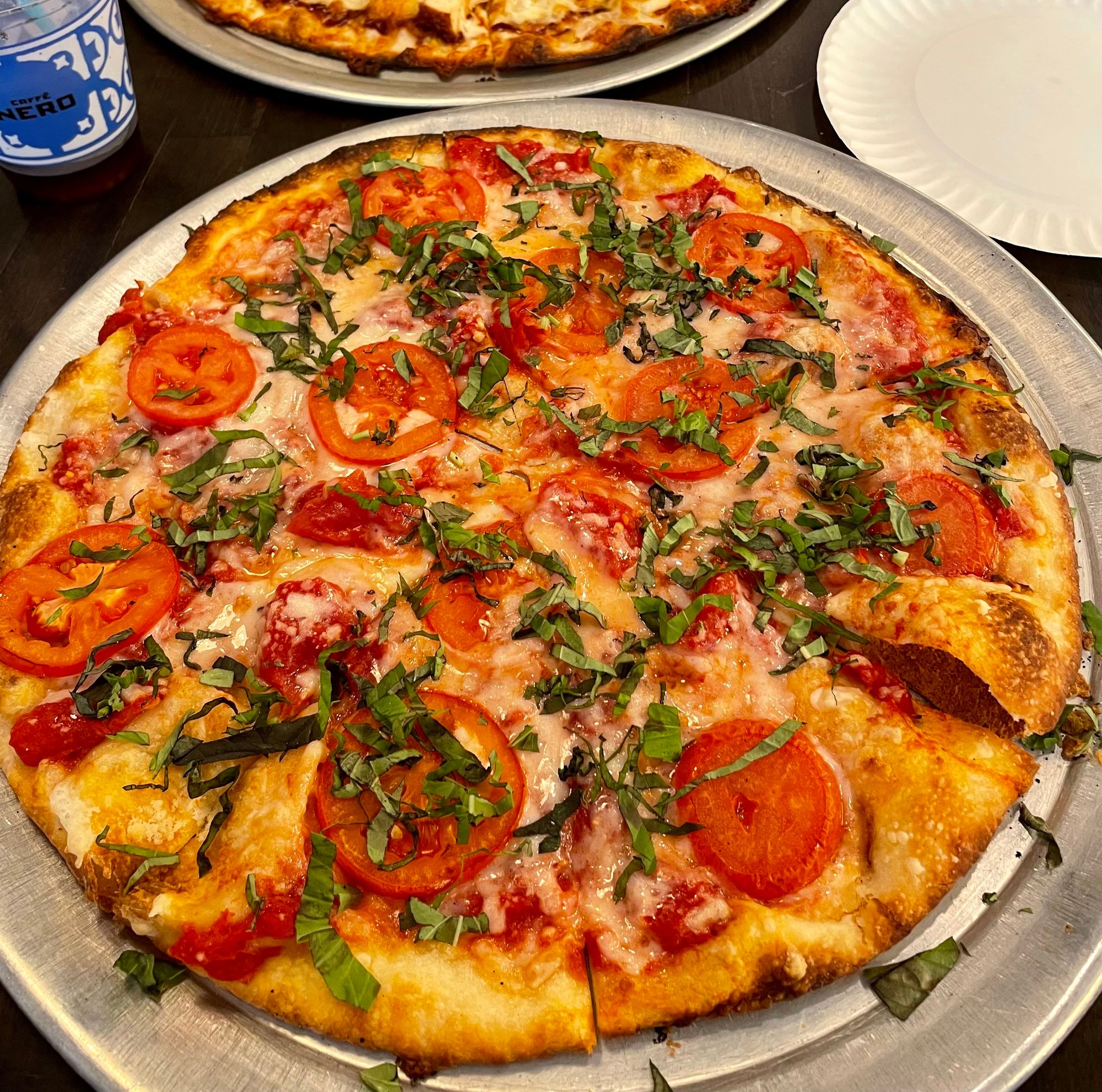
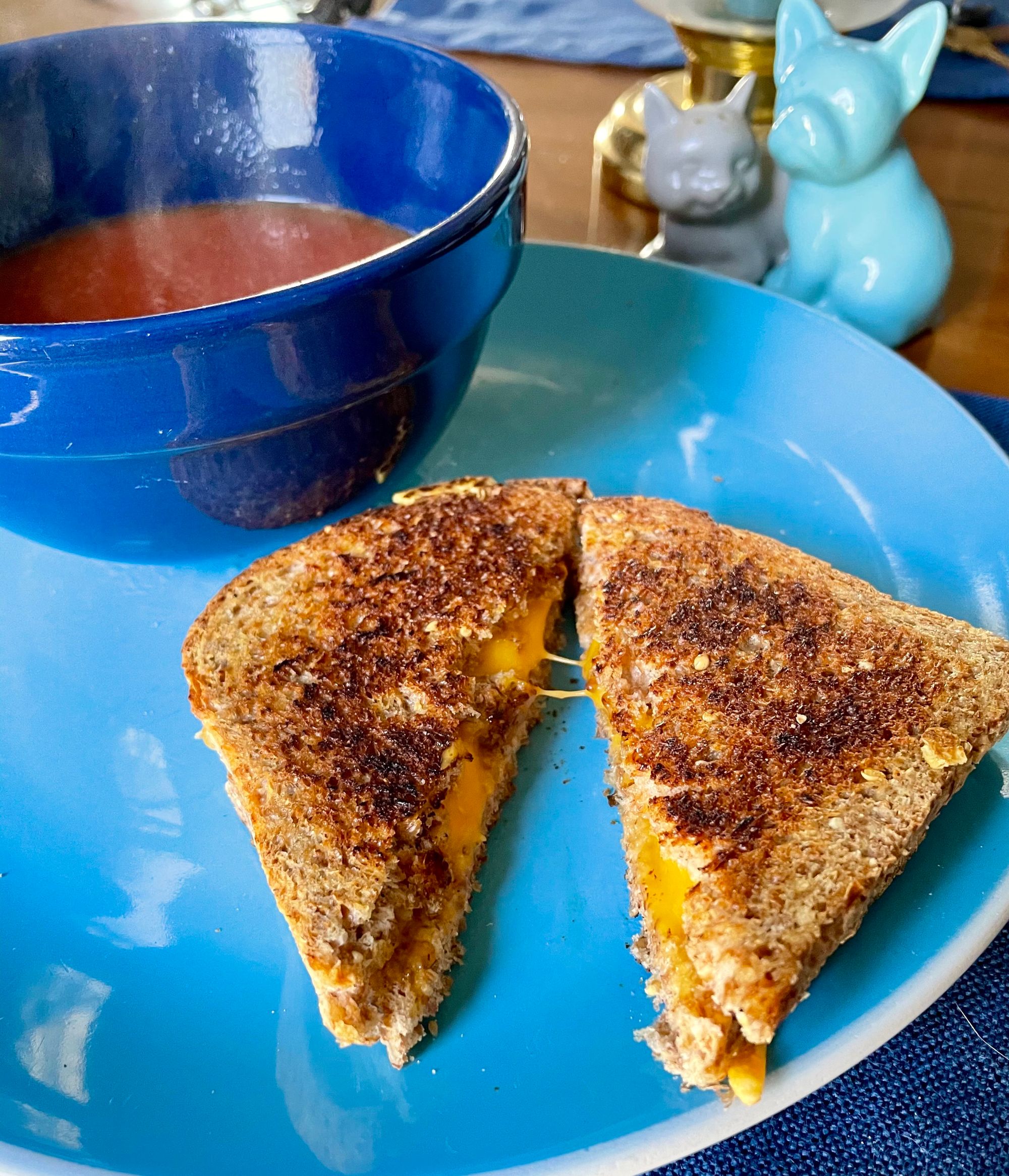

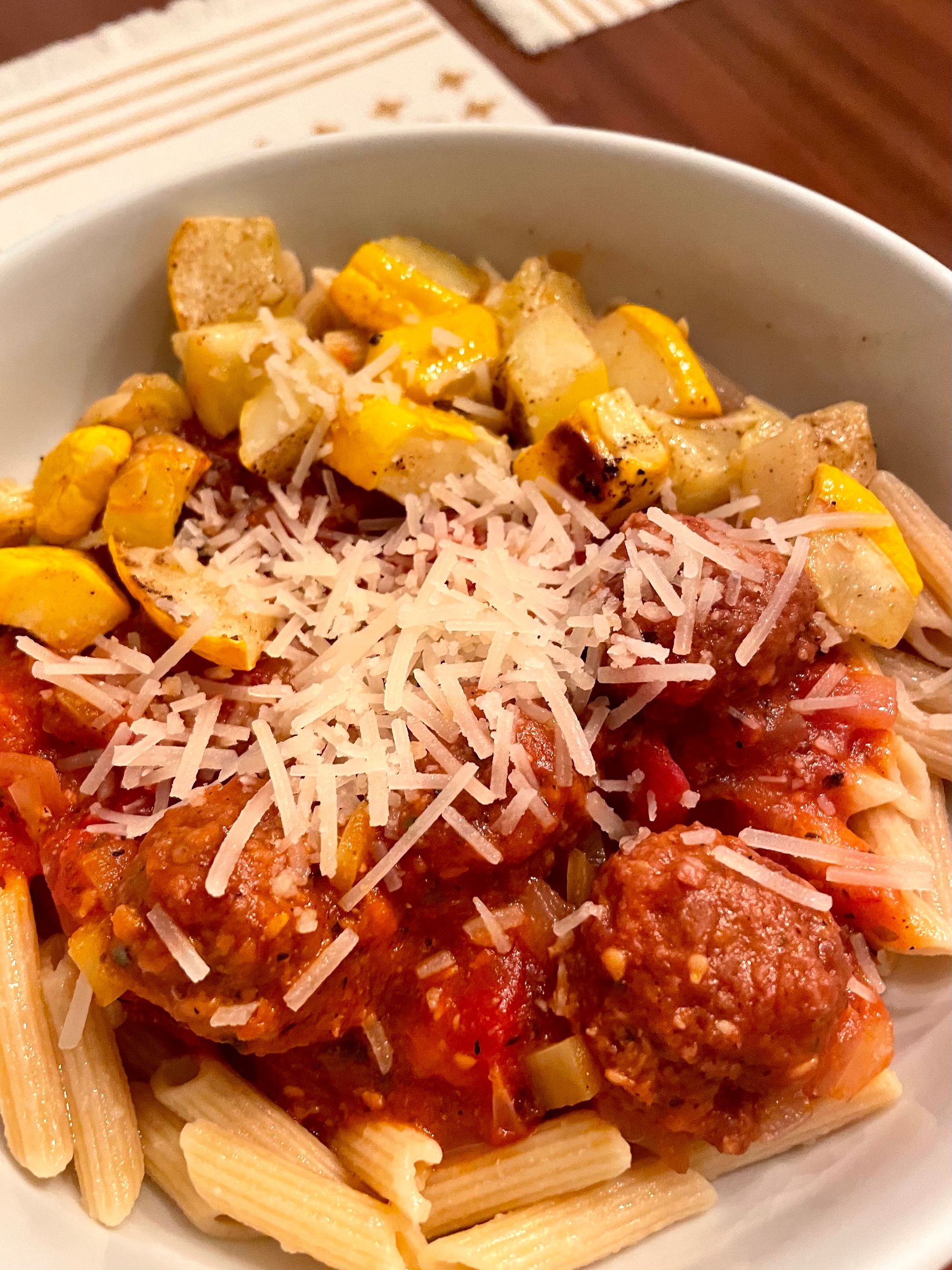
A sampling of vegan foods I've made or eaten over the last four years
Note: I'm not recommending a specific diet for you or anyone. I've had an amazing experience eating vegan foods, and I want to share that experience with others.
The practical aspects of vegan foods
When transitioning my dietary patterns in 2019, I first had to learn some practical aspects of vegan foods: how to define them and how much they would cost.
First, some definitions
Most people understand that vegetarians don't eat meat. But what do vegans eat?
There are two simple ways to explain vegan foods: they are any foods made without animals, and they include all foods produced solely from plants (or fungi).
Practically speaking, a vegan diet looks like a vegetarian diet that additionally excludes the rest of animal-derived foods — obvious ones like dairy and eggs and less obvious ones like honey and gelatin.
Veganism is broader than a vegan diet, however.
"Veganism is a philosophy and way of living which seeks to exclude — as far as is possible and practicable — all forms of exploitation of, and cruelty to, animals for food, clothing or any other purpose; and by extension, promotes the development and use of animal-free alternatives for the benefit of animals, humans, and the environment. In dietary terms it denotes the practice of dispensing with all products derived wholly or partly from animals." —The Vegan Society
For example, vegan philosophy also means avoiding leather, cosmetic products tested on animals, and horse racing events.
The "as far as is possible and practicable" qualifier is important for veganism to succeed. Needing to make an exception from a "pure" vegan lifestyle is not a "sin." If you consumed Worcestershire sauce without knowing it contained fish, you're not excommunicated. When the government requires vaccines to be tested on animals, you're still doing the right thing by getting vaccinated.
We need millions of people practicing veganism imperfectly, not a handful of perfect vegans.
And in dietary terms, "vegan" is at one end of a whole spectrum of plant-based eating. "Plant-based" means primarily plants, whether it is describing a product, a full meal, or your entire diet.
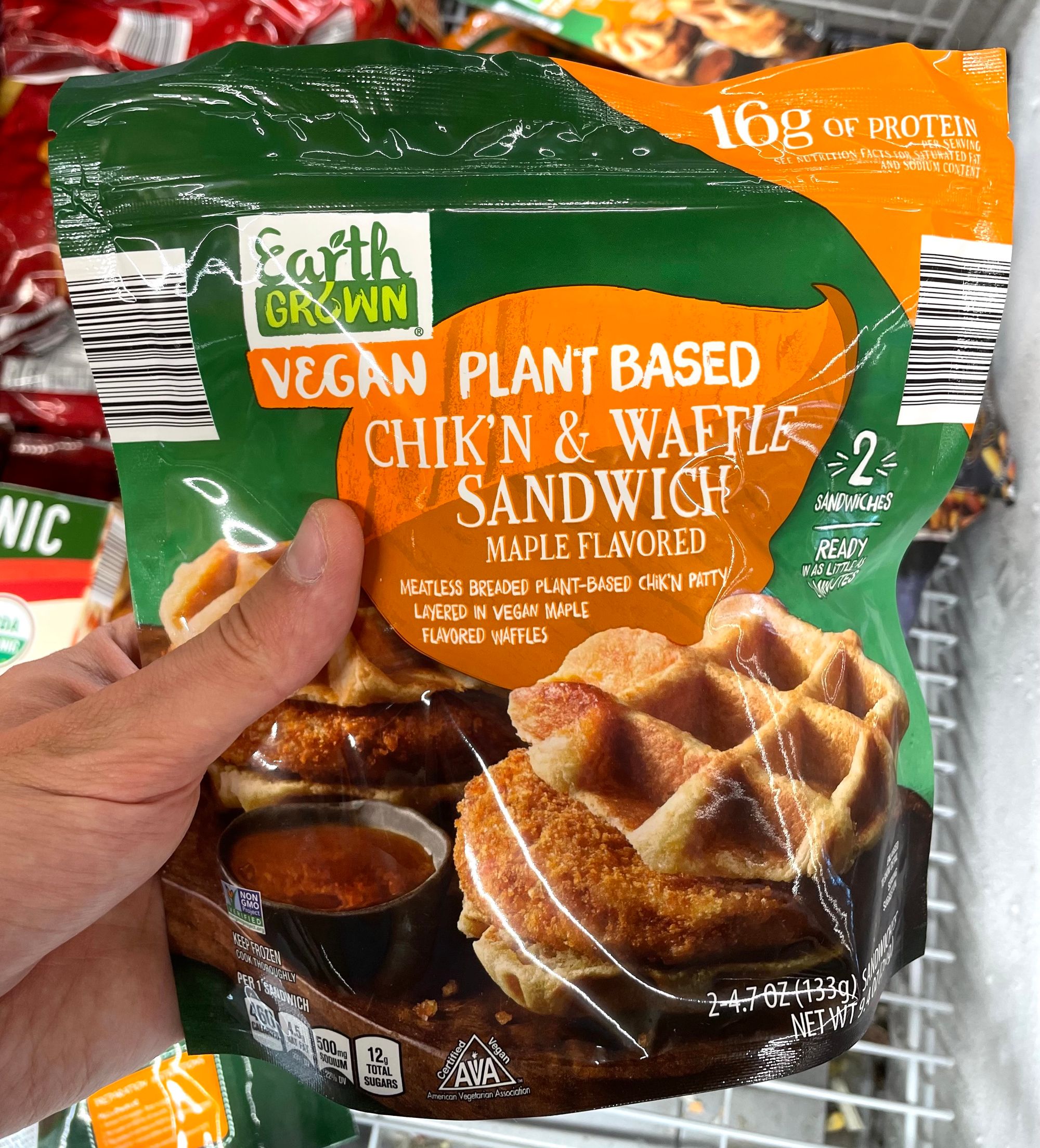
"Vegetable-forward" cuisine is on the plant-based spectrum. If a taco salad includes a sprinkle of chorizo as a "condiment," they could call it "plant-based." On food labels, "plant-based" has no certification or legal standard, so a black bean burger patty containing cheddar cheese would not be vegan but can be labeled plant-based and vegetarian.
Many people find plant-based foods exciting and refreshing even without taking on any philosophy about animals. That describes me as a vegetarian in early 2019! I value the increase in plant-based foods even when they are not vegan, since I believe they still benefit people and animals in general.
Next, let's talk costs
Are vegan foods more expensive than omnivore foods?
The most expensive items in a typical U.S. grocery cart are meats, eggs, and dairy. This had always been my experience when buying groceries, even from our Aldi bargain store. (And huge corporations like Tyson have been raising prices to multiply their profits.)
Compare the U.S. Department of Agriculture's own healthy eating guide, MyPlate, and their analysis of the cost shares of those foods.
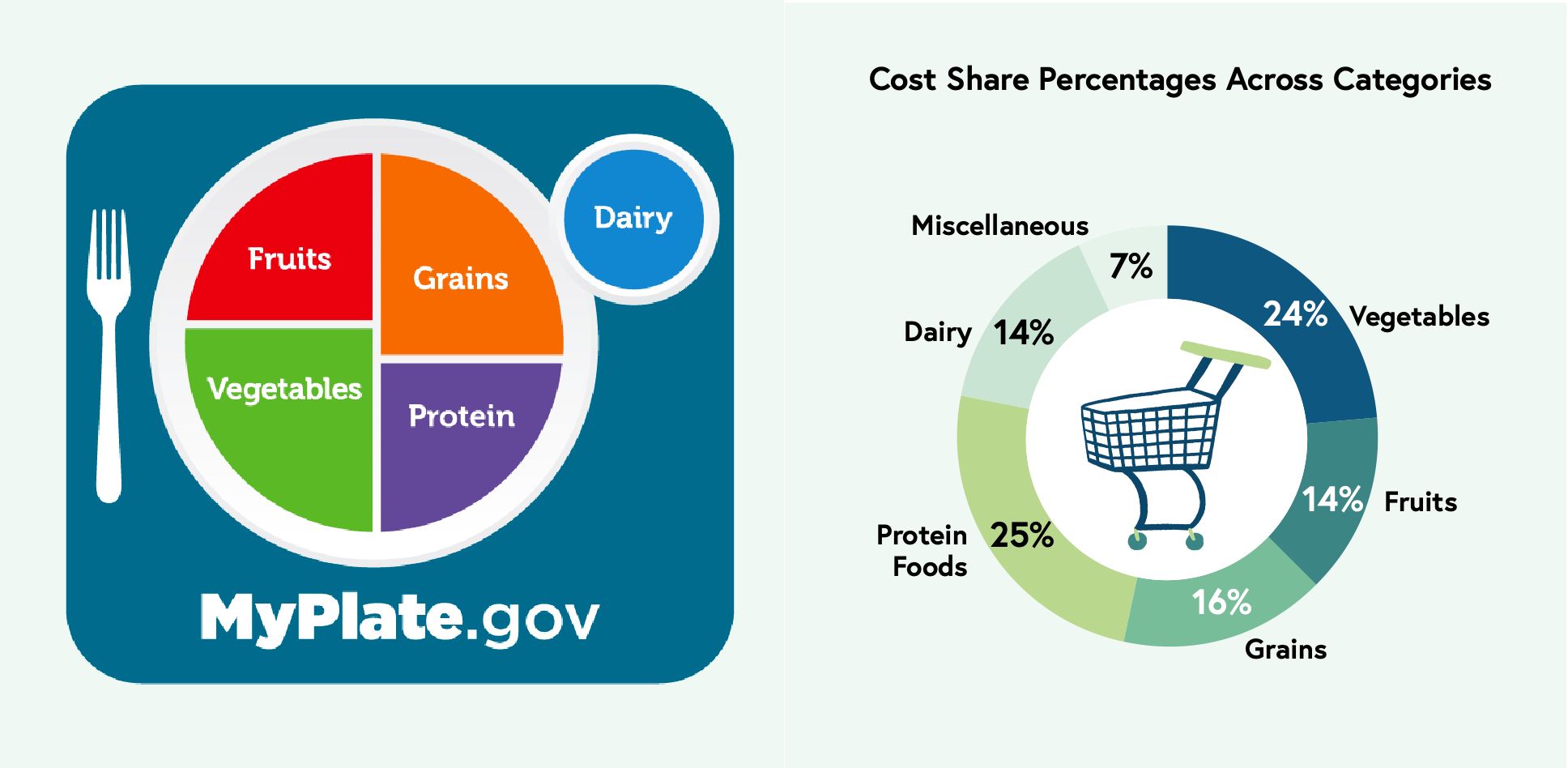
The "protein foods" category is disproportionately expensive compared to fruits, vegetables, and grains. In this analysis, nuts/seeds/soy products are about 11% of the "protein foods" in both quantity and cost, with the rest being animal products.
The USDA's "dairy foods" recommendation is mostly just "drink three cups of dairy milk per day." (Most people don't enjoy drinking more than a cup of milk.) And while soy milk is considered an equivalent to dairy milk, it would increase the "dairy foods" cost share, since soy milk is currently at least 50% more expensive than dairy milk.
The USDA says the "Healthy Vegetarian" version of its recommended dietary guidelines can still be accomplished within the cost of the Thrifty Food Plan above. To go further plant-based and more thrifty, cut down on meats, eggs, and dairy (and optionally add in some soy milk). This frees up cash for a lot of flexibility! The remaining fruits, vegetables, and grains are less cost-sensitive.

Think of some of the "cheapest" foods you know: brown rice, canned beans, whole grain pasta, in-season fruits, frozen vegetables, peanut butter. Many inexpensive foods are not nutritious, but nutritious foods can be inexpensive.
I found that my shopping routine and budget didn't change much at all during my transition from 2019 to 2020. Vegan groceries were similarly or less expensive. I did begin a love affair with some locally-made tofu and hummus at a couple of specialty shops, but most of my food still came from Aldi. (Even highfalutin foods like quinoa, vegan meatballs, and fake cheddar come in bargain store brands now.) The next big change to my purchasing habits would be getting fresh produce from a farm share in 2021... More on that happy discovery some other time.
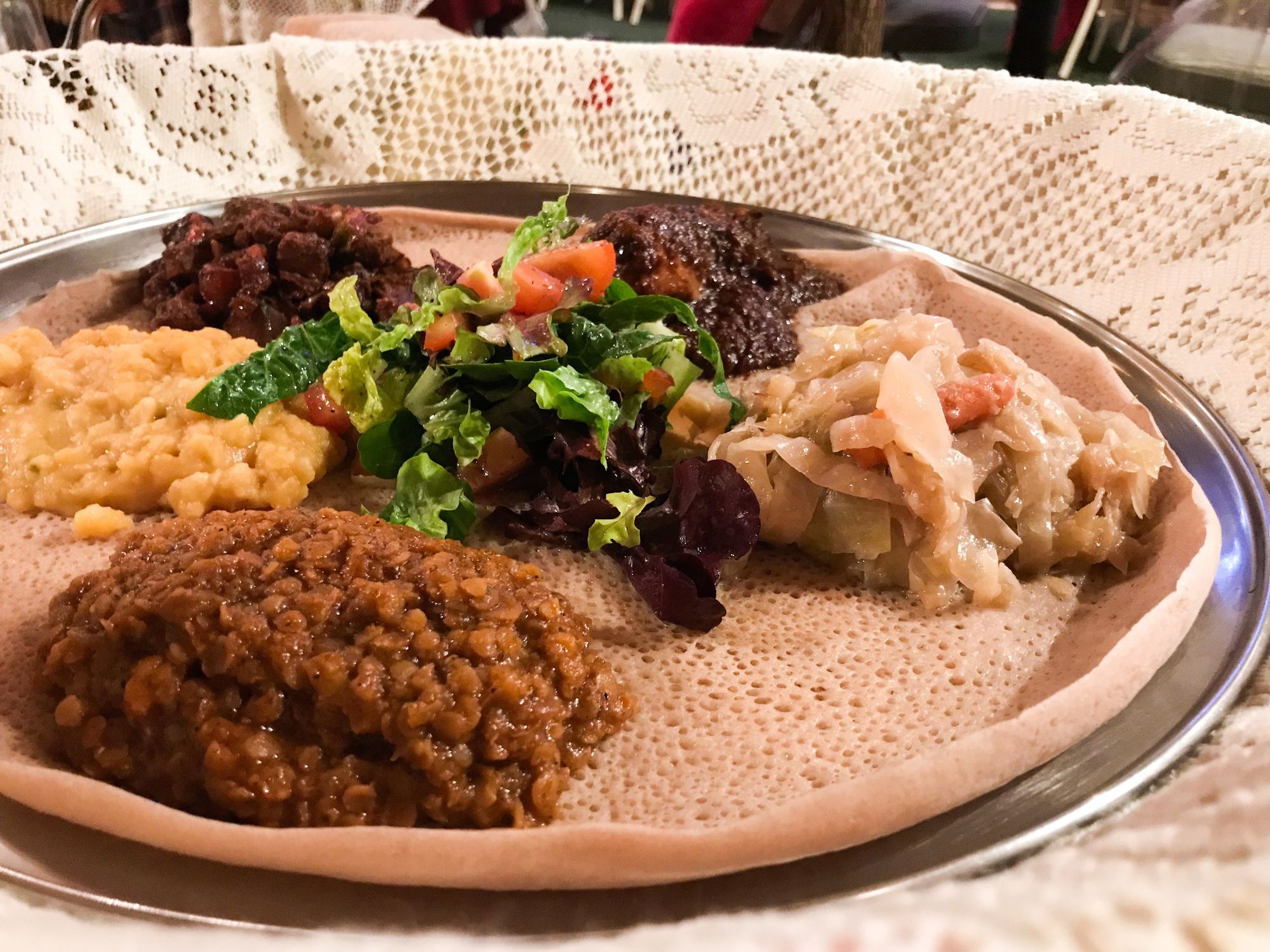
While dining out as a vegan can be pricier, it's due to the more expensive restaurants having more vegan options, not due to expensive ingredients. On the other hand, exploring Ethiopian and Indian restaurants has given me, a white boy from Appalachia, a better appreciation for cultural foods that are affordably vegan for their own sake, not for pretense!
Why I love being vegan
"Vegans are annoying," I thought up through 2018. "How do you know someone is vegan? Don't worry, they'll tell you," the internet joked. But now I know that...well, both of those are true.
Vegan people are annoying because they truly love being vegan and want to talk about it! Here's why.
For our environment and animal welfare (wow, selfless!)
My 2019 resolution began as a small step towards being a better global citizen. It fit in with other similar steps: drive less often, take reusable bags to the store, recycle, and eat less meat.
Later that year, I saw two fascinating films that pushed me into my commitment to veganism.
The first was Right to Harm, shown that springtime during the Cleveland International Film Festival. The documentary exposed the problems with concentrated animal feeding operations, or "CAFOs."
Unlike most activist footage that tries to shock you with the gruesome conditions inside factory farms, this film focused on what's outside them. And what's outside factory farms is a tremendous amount of animal shit.
The documentarians interviewed rural residents whose lives were made miserable by the constant flow of waste from factory farms packed with pigs, cows, and chickens. The shit fills ponds, leaks into fresh water, and gets sprayed in the air, making people sick. There are about 150 licensed CAFOs here in Ohio.
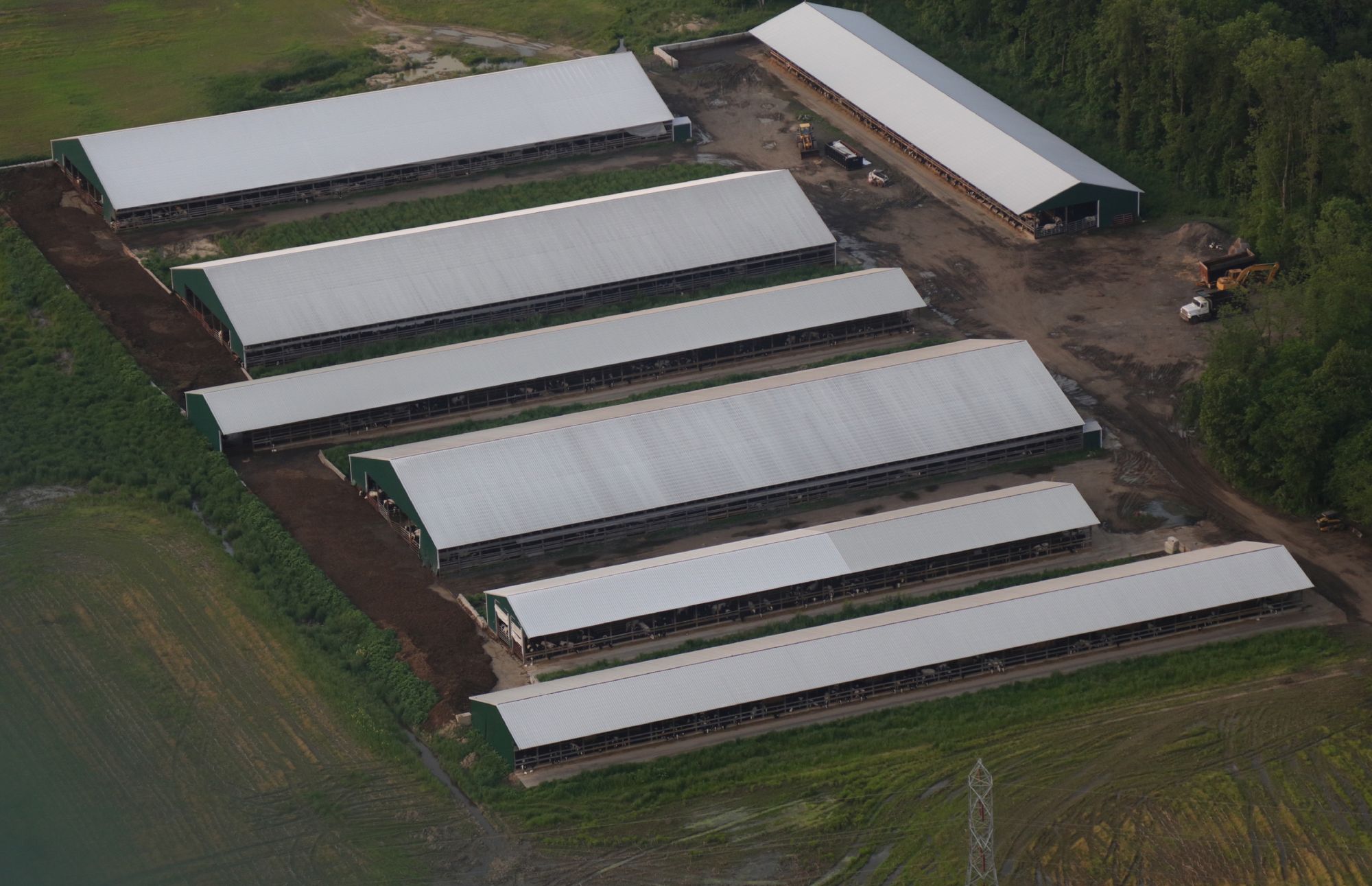
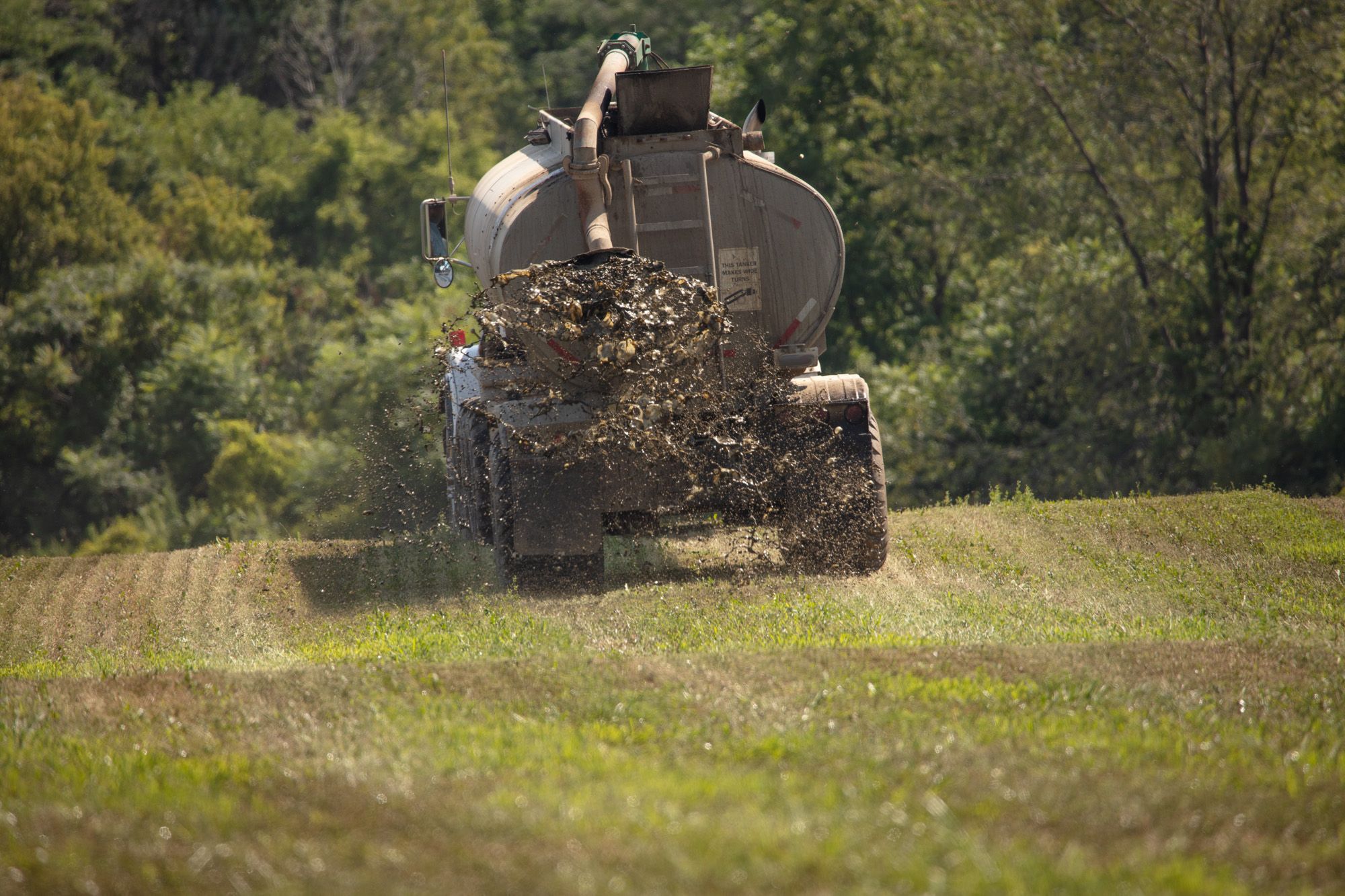
CAFO and waste in southeast Michigan (Maumee River watershed flowing into Lake Erie)
After that film, the hypothetical harms of factory farms felt much more real and close to home.
I puzzled over what causes these cruel CAFOs and their messes. I thought they might be necessary for the food supply for our growing population. But basic research showed me that meat production is an incredibly inefficient (and very Western) method of feeding people. On average, animals must eat 12-14x the calories and protein that they can provide in consumed meat. Beef by far is the least efficient, with only about 3% of the calories and protein taken in by a cow ever making it to a plate. Only corporate profit makes this math make sense. Hamburgers are a best-selling product, of course.
The Fisher Price version of a happy farmer and their animal friends was disintegrating in my head. And it was replaced with more and more troubling facts about industrial farms and meat production.
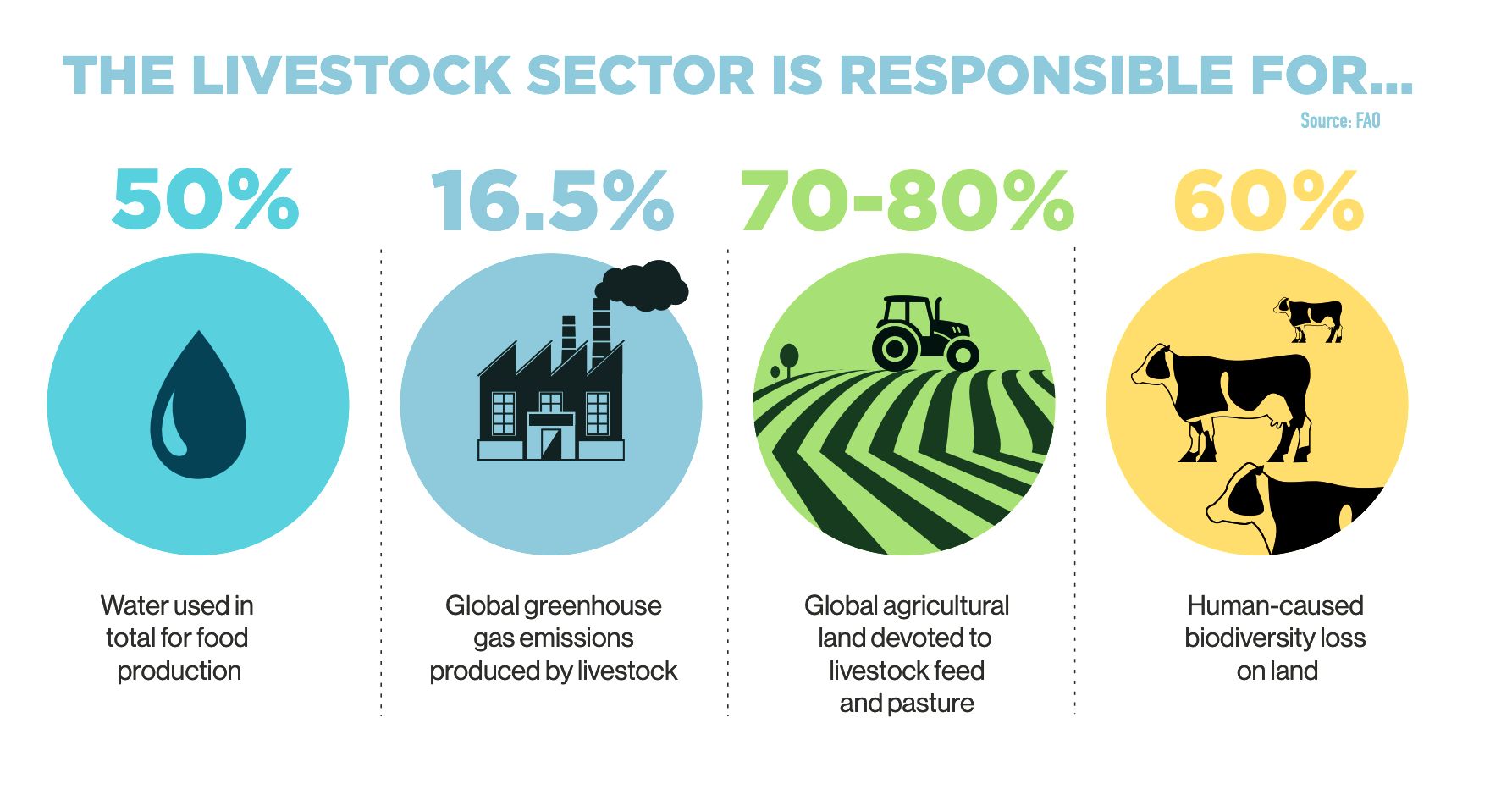
Willful ignorance had been removed from my choice options. If I could give a small boost to water conservation, climate, food supply, and biodiversity...and prevent a few animals from being bred into existence to suffer...by trying delicious new foods...then I had to.
Now don't get me wrong, I believe governments and corporations created these problems and must solve them. I also believe living my values makes me, as an individual citizen, more engaged and resilient for the long, difficult, collective push for real policy changes.
For my personal health and performance (wow, selfish!)
The second life-changing film I saw in 2019 was The Game Changers. It was like Rocky for vegans, and my neighbors took me to see the Cleveland premiere in September.
This documentary is essentially propaganda. Its executive producers include James Cameron, Arnold Schwarzenegger, and Pamela Anderson. It includes some junk science. But, holy shit, is it fun to watch propaganda of athletes kicking ass on plant-based diets.
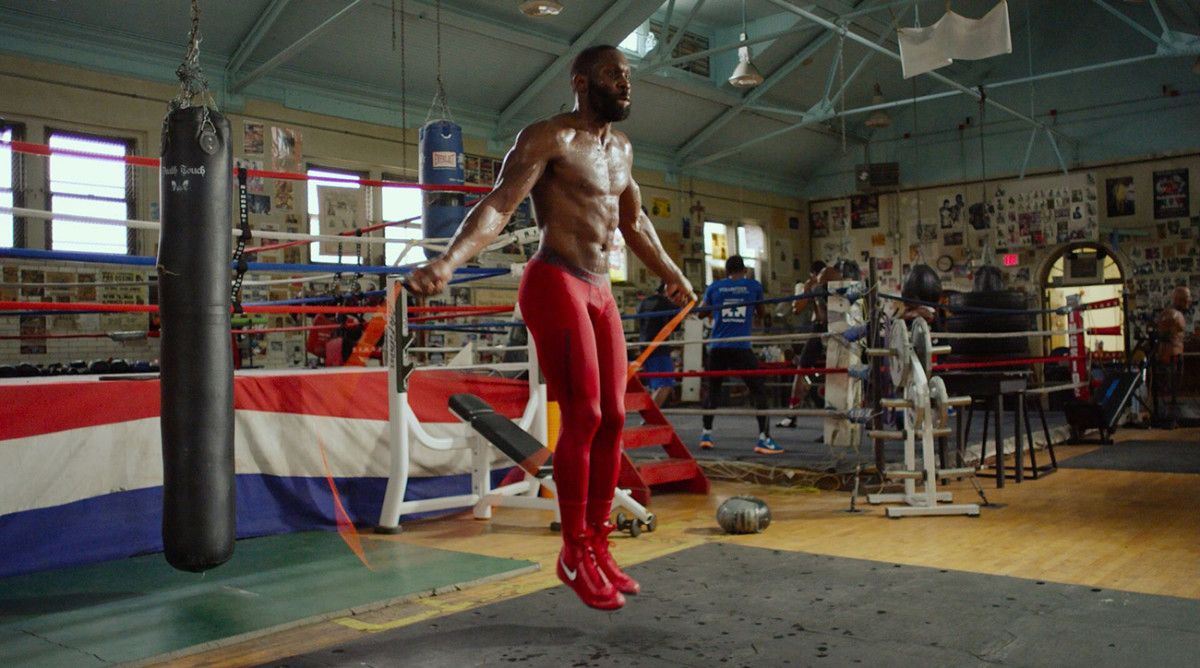
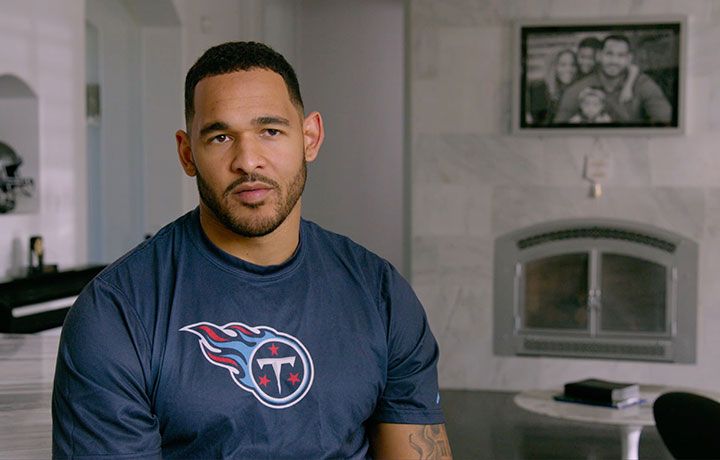

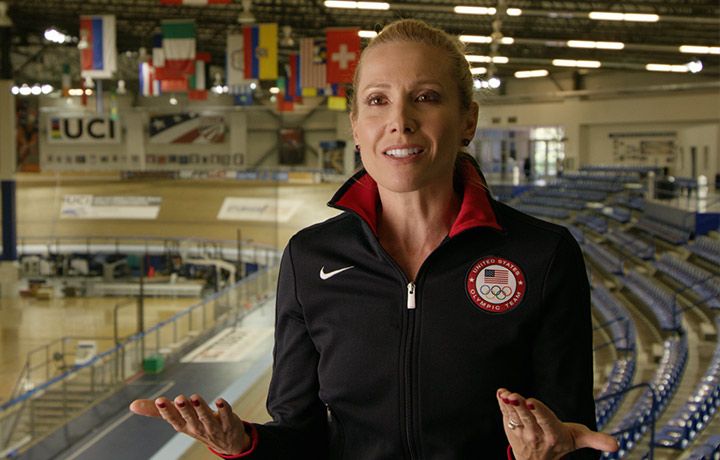
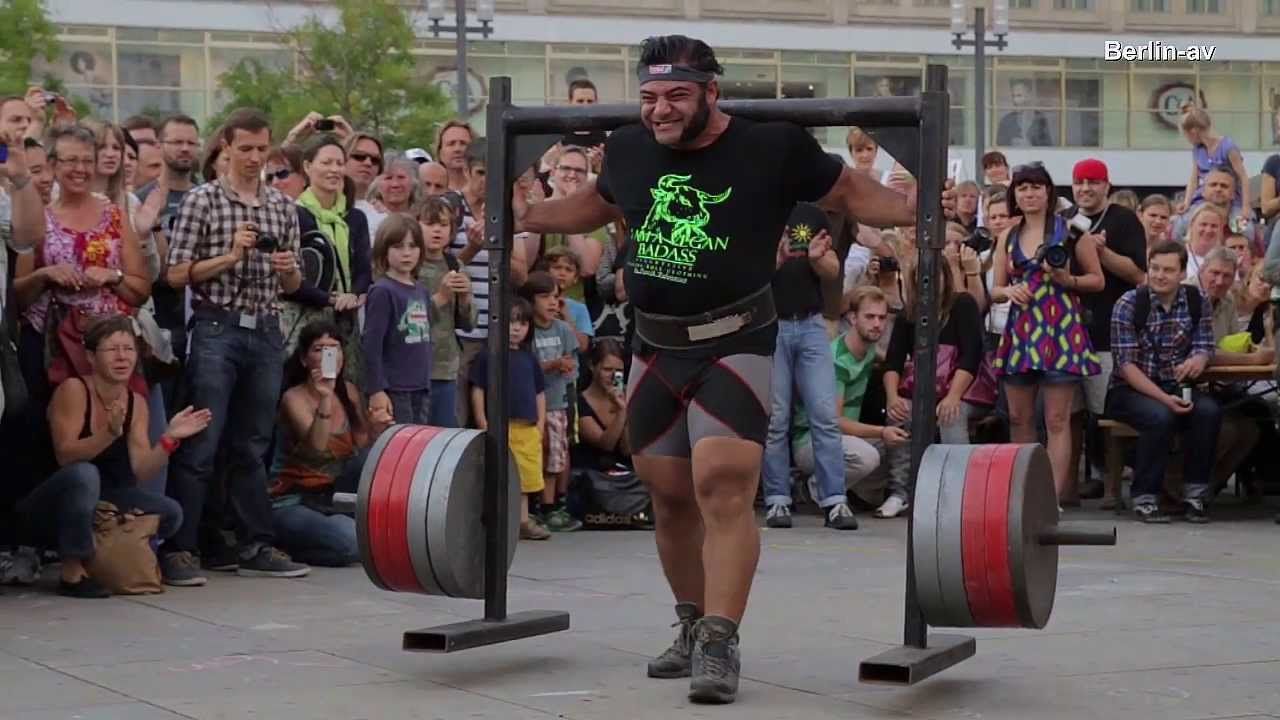
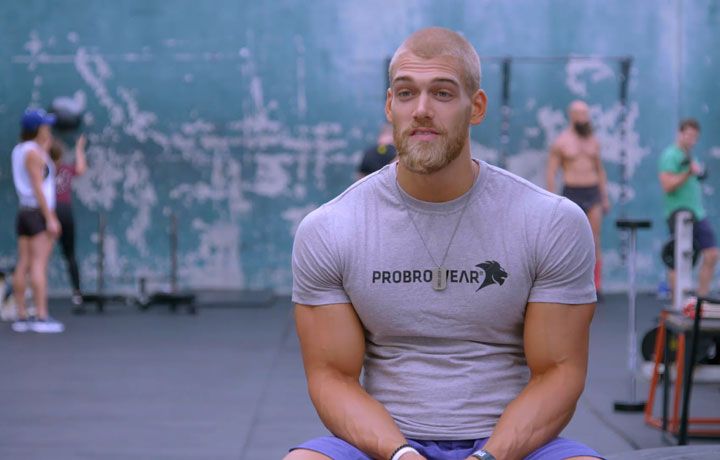
Reimagining myself as an athlete was already a fulfilling process for me by 2019, and these athletes showed me that my vegan lifestyle was part of that identity, not contradictory to it.
The Game Changers also addressed head-on the most frequent concern about vegan health: What about protein?
The answer from the film's athletes and doctors is that plants have all the protein we need. I've done a lot of research into that claim, since I know getting enough protein is important for my strength training goals.
(That's 0.73 grams per pound. 🇺🇸)
Now hold up. 1.6g/kg is a good bit less than most gymgoers think. (Many guessed around 2.4g/kg in this survey, which is an unnecessary amount, though probably still safe). The studies also are not very size-inclusive, so this per-kilogram formula assumes lower body fat and can give larger-bodied people unnecessarily high protein targets.
And if you're not an athlete, the World Health Organization says you need 0.83g/kg per day, a little more than half the NSCA recommendation, on average.
The NSCA recommendation works out to at least 135g of protein daily for a 185lb athlete. The WHO recommendation works out to 70g of protein daily for a 185lb person who is not training.
In other words: If you're 180lbs and not already a lean-body athlete, you can shoot for 131g/day and miss, so long as you stay comfortably above 70g/day, while training.
See more of my thoughts about protein recommendations here.
So when some whey protein ambassador on Instagram says "How will you get your 200 grams of protein without meat??," you can answer, "I won't."
But remember when we reduced most of our "protein foods" from the MyPlate guidelines above to save money? Doesn't that set us up for protein failure?
The secret of plant-based foods is that most foods have some protein. So even when vegan foods have less protein than animal products, the protein still adds up quickly to your daily intake goal.
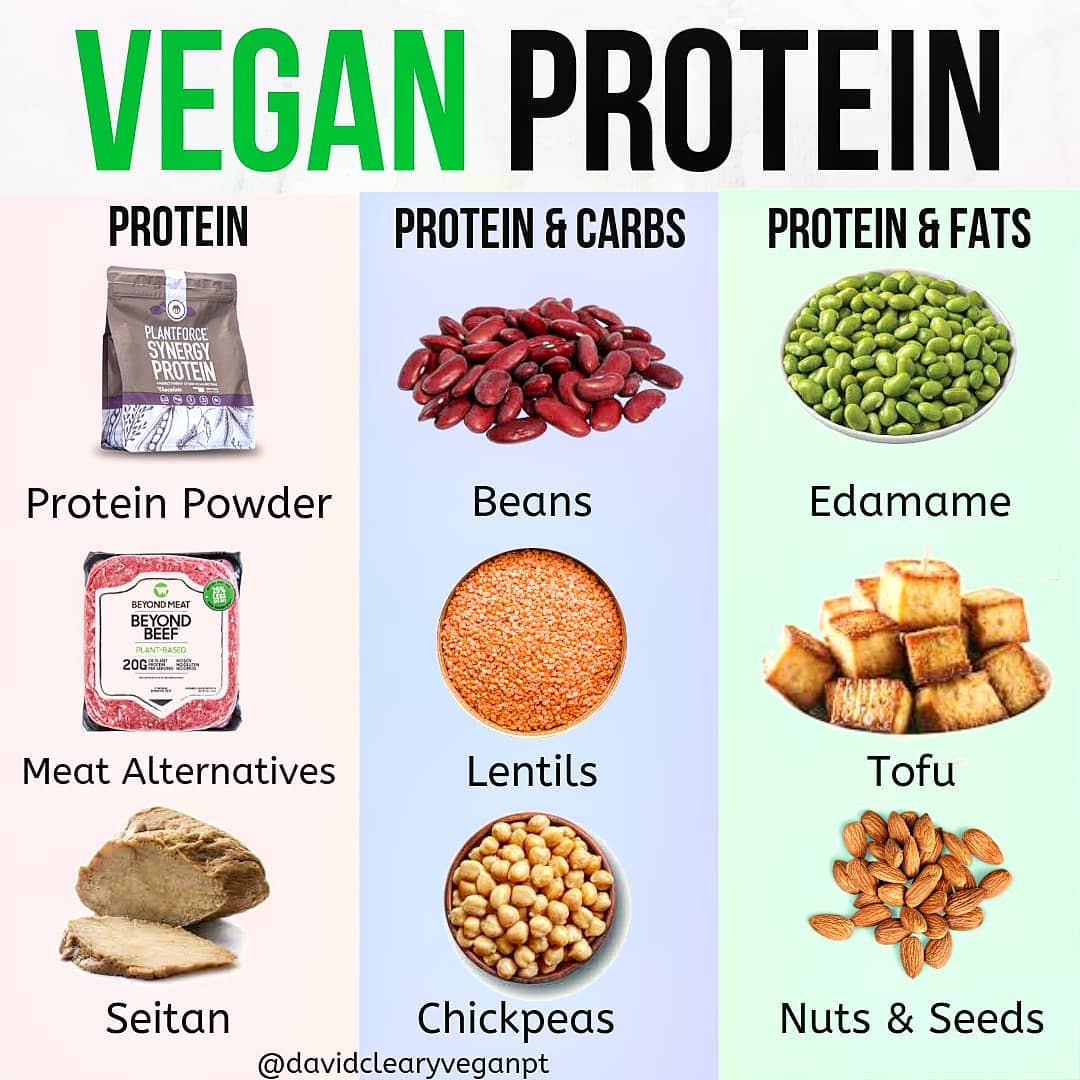
For example, this lentil soup recipe has 21g of protein in one bowl. If you ate that soup with two slices of whole grain garlic toast, your meal would have at least 32g of protein, putting our 185lb athlete about 25% of the way to their daily goal. (Side note: I used to hate lentil soup as a kid, but now a big bowl during snowy weather is sooo satisfying.)
Some people also wring their hands about the "incomplete proteins" of (some) plants compared to meat. A "complete" protein food has all 9 essential amino acids in one food (as is the case with these plants: quinoa, soy, buckwheat, and hemp). But eating in variety day-to-day virtually guarantees that foods relatively low in certain amino acids will be compensated by other foods. Most complete protein combinations are very logical, too: peanut butter & wheat bread, pita and hummus, black beans & tortillas, peas & corn, peanuts & seeds.
In fact, rice and beans is a complete-protein meal that powers populations all across the world, even though it doesn't have a single USDA "protein food" in it.
You can still bring protein-rich "meat substitutes" like veggie burgers, tofu, tempeh, soy curls, and seitan into your mix. An athlete is welcome to continue taking their protein powder for peace of mind by switching to a vegan (and likely cheaper) source. Add it all up, and you'll see you can easily meet or overshoot your daily protein requirement. Studies like this one show vegans and omnivores show no significant difference in muscle growth when consumering 1.6g/kg protein daily.
Some of the athletes in The Game Changers carefully tracked their protein, and some didn't. I spent about a year as the former before I became the latter. I found that if I ate a variety of wholesome, vegan meals in satisfying portions, along with a pea protein powder to replace my whey protein habit, I was getting plenty of protein without really trying.
I also noticed that I felt good. Really good.
Most of the benefits I felt from a vegan diet were the same as anyone would get from eating more veggies and less ultra-processed food. (While there are some foods that are ultra-processed and vegan, like Oreos or Beyond Meat, they are still less common.) I was easily getting more fiber as well as less sugar and fat by filling up on "lighter" foods, making my digestion feel easier.
These foods were also inherently less calorie-dense, allowing me to eat more. Back in high school, I remember, I could eat an entire pot of mac 'n' cheese after dinner and still feel great, because I was a teenager with a revved-up metabolism. Now I was getting that full feeling again by devouring an enormous Buddha bowl of plant foods.
Despite being less calorie-dense, wholesome foods are more nutrient-dense. Most of the best sources of vitamins and minerals are fruits and veggies, of course. I also found I was naturally eating more carbohydrates, the complex kinds wrapped up with fiber in oatmeal, rice, fruit, and beans. This meant I felt more energized because my body had more reliable sources of energy.
Some dietary benefits are more unique to vegans, even compared to a healthy omnivore diet. Fruits and veggies are full of helpful, antioxidant vitamins, while red meat and processed foods contribute to inflammation instead, so I started experiencing faster recovery from fatigue and pain. About 65% of the U.S. population is lactose intolerant, and eliminating dairy also eliminated bloated feelings for me.
But just because my energy, digestion, and recovery seemed improved didn't mean I wanted to leave my performance goals up to gut feelings. I wanted data. I continued tracking my same strength workout routines in my Strong app during my first year of vegan eating.
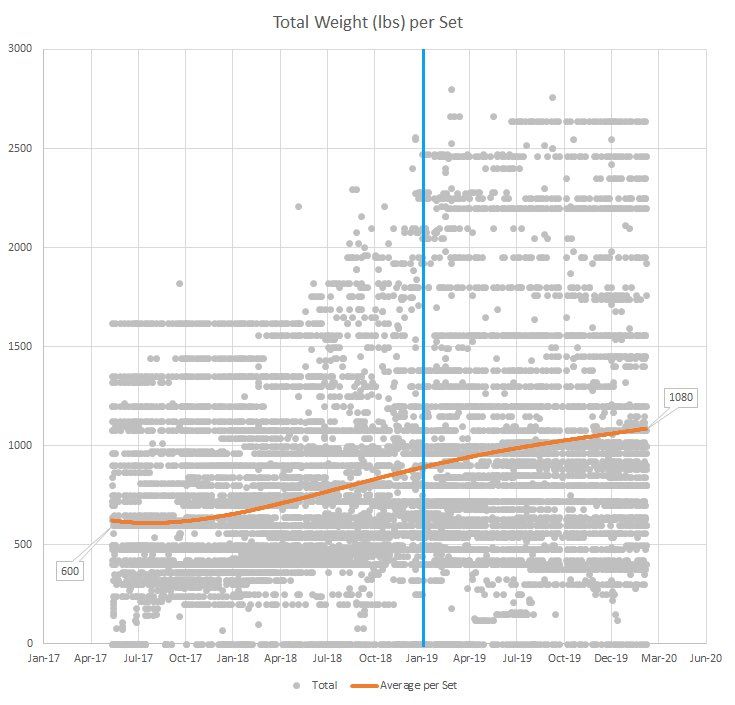
In my graph above, each point is the total weight (volume) lifted per exercise set in 523 workouts across almost 3 years. (I filtered out bodyweight exercises, so these volumes are all added resistance.) The trend line shows I was lifting about 80% heavier in the same sets by 2020 than I had in 2017. The blue line marks when I started eating more plant-based. Despite my training frequency staying the same, I was moving more weight.
I felt confident that my strength training progress was unimpeded, if not improved, by my vegan diet. Win-win.
Still, even with the likely benefits, there are a few nutrient concerns that can arise in a vegan diet, which makes it wise to discuss with your doctor. It's easy to take in less calcium when you're not eating dairy, so soy milk and beans are smart sources to include. The same risk is possible with iron when you're not eating meat, though you'll find iron in legumes, seeds, grains, and fortified cereals. Like most Americans, vegans tend to be deficient in Omega-3 fatty acids and Vitamin D, so doctors often recommend supplements. Vitamin B12 is the essential nutrient hardest to find in vegan foods, so, unless you consistently use the cheesy seasoning called "fortified nutritional yeast," a B12 supplement is useful.
It made my doctor happy to see that I had no apparent nutrient deficiencies after my first three years of vegan dietary patterns. I'll keep checking in with him!
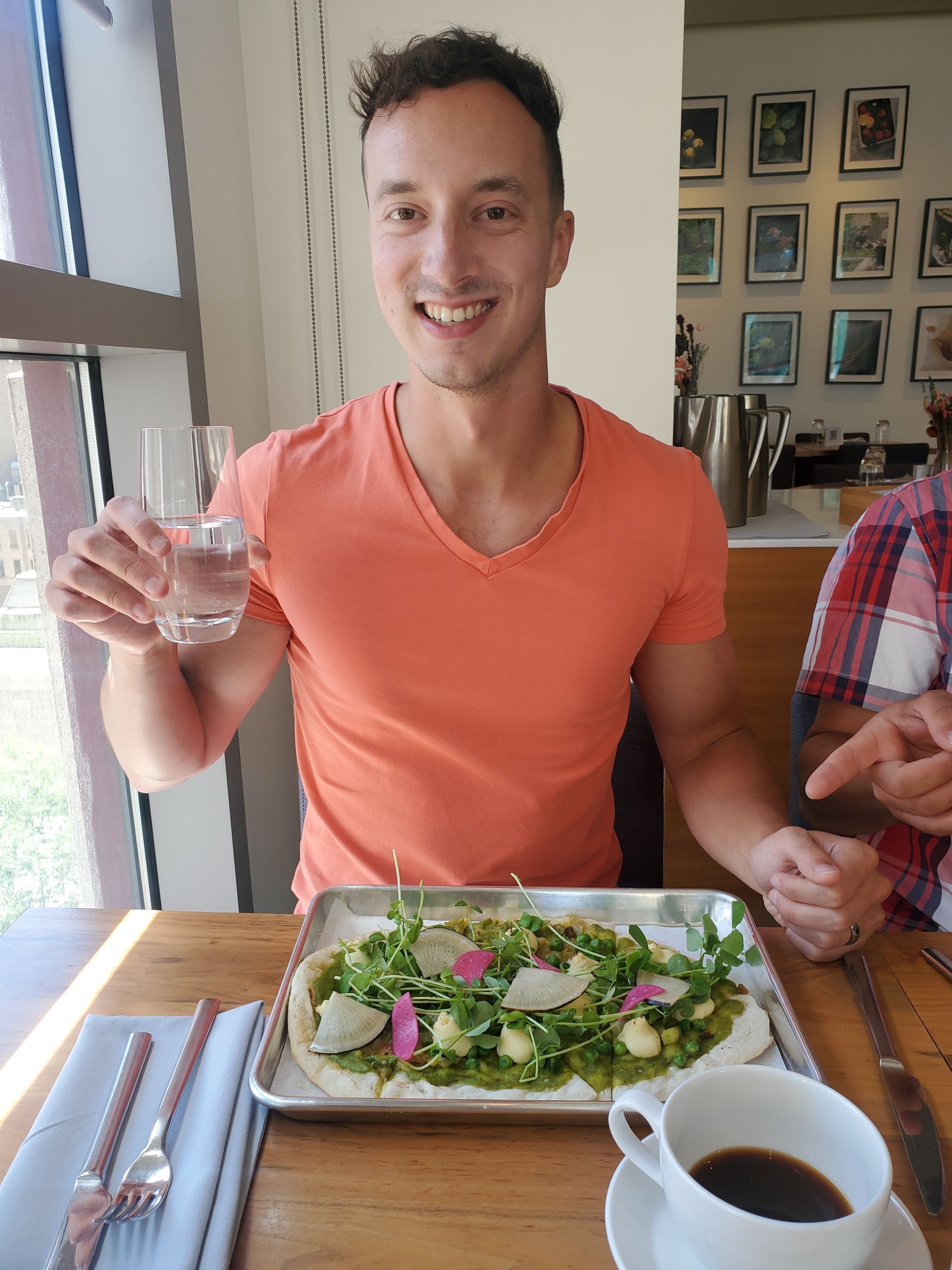
It's safe to say that even if I was not concerned with the environment or animal welfare, I would still love how vegan foods make my body feel.
I stay fueled up for exercise and recovery, and I genuinely enjoy the yummy foods making that possible. I've even figured out some of my favorite recipes that I cook again and again.
New plant-based options are coming out constantly (some wholesome, some not). I feel less restricted in restaurants all the time, and I never feel restricted at the grocery store.
Both selfish and selfless reasons keep me committed to veganism for the long term. Annoying or not, I appreciate you reading about something I love! And to pay it forward for the friends who encouraged me, I'd be happy to point you as you make plant-based choices.
